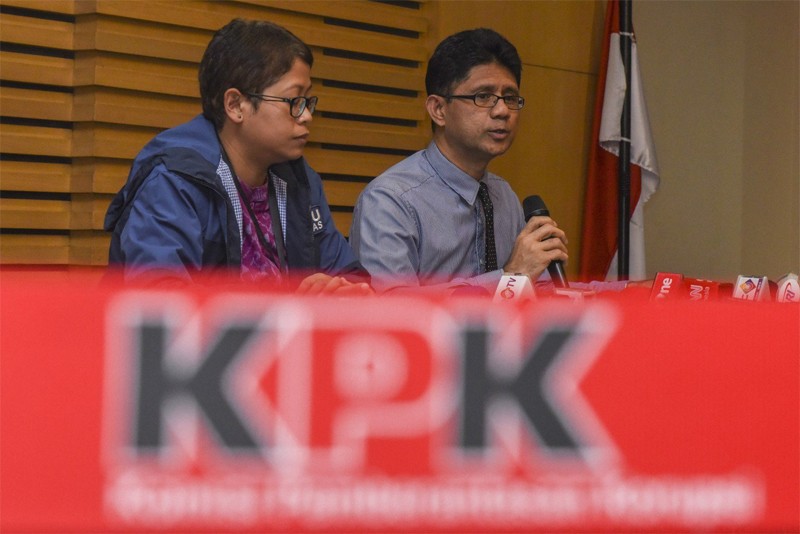Popular Reads
Top Results
Can't find what you're looking for?
View all search resultsPopular Reads
Top Results
Can't find what you're looking for?
View all search resultsCorruption threatens Indonesia’s biodiversity and conservation sector
Corruption facilitates illicit wildlife poaching and trafficking, creating opportunities for bribery and extortion of officials involved in customs, licensing, and certification processes for wildlife products.
Change text size
Gift Premium Articles
to Anyone
I
ndonesia faces numerous conservation challenges, including forest fires, air pollution, wildlife crimes and natural-resource exploitation. At the heart of these issue lies integrity and corruption, which have become major obstacles for law enforcers.
Research has shed light on how corruption contributes to biodiversity loss and environmental degradation. To combat this menace, we must focus on raising compliance awareness and enhancing the technical and integrity-related competency of forest rangers, police and customs officials.
Conservation efforts in Indonesia are hampered by the inadequate implementation of environmental regulations. Despite ratifying the Convention on International Trade in Endangered Species of Wild Fauna and Flora (CITES) and developing various conservation-related regulations, enforcement remains weak. As a result, the illegal wildlife trade has flourished, making it one of the country’s largest crimes.
The absence of robust sanctions, limited resources and poor coordination among government units perpetuate this issue. Furthermore, these crimes have been fueled by the advancement of technology and financial services, enabling illicit transactions to occur more easily and discreetly.
Corruption associated with wildlife crimes has emerged as a grave global environmental concern. The estimated annual value of the illegal wildlife trade worldwide ranges from US$7 billion to $23 billion. Corruption facilitates illicit wildlife poaching and trafficking, creating opportunities for bribery and extortion of officials involved in customs, licensing and certification processes for wildlife products. Weak legislation and enforcement exacerbate this problem.
Corruption is also deeply rooted in the exploitation of natural resources and land in Indonesia. Despite having substantial environmental and natural resource policies, their actual implementation suffers due to weak political consensus or lack of will within sector agencies, limited awareness at local levels and capacity challenges across all government levels.
Natural-resources management remains vulnerable to graft, particularly in the issuance of permits, spatial planning and corporate adherence to environmental regulations. Licensing processes often witness rampant bribery, with large companies offering bribes to regional leaders or government officials to secure business permits for resource exploration and exploitation.
Former deputy Corruption Eradication Commission (KPK) chief Laode Syarif provides examples of corruption cases, including that involving East Kalimantan governor Suwarna Abdul Fatah in land-permit issuance. The KPK also arrested former Riau governors, Rusli Zainal and Annas Maamun, in forest-exploitation cases.
Additionally, former Southeast Sulawesi governor Nur Alam was imprisoned for granting mining permits in a protected area. Furthermore, Supian Hadi, the regent of East Kotawaringin in Central Kalimantan, was named a corruption suspect for allegedly misusing his authority to issue business licenses to three mining companies.
These cases highlight the pressing issue of corruption in the conservation sector. Capacity building for officials is crucial in promoting compliance and integrity to combat corruption in natural resources and land.
The palm oil industry exemplifies Indonesia’s integrity challenges. While playing a pivotal role in economic development, it remains a leading cause of deforestation, air pollution and loss of endangered animal habitats.
Although Indonesia has committed to producing sustainable palm oil through the Roundtable on Sustainable Palm Oil (RSPO) certification, corruption in land acquisition remains widespread due to the lack of government transparency. This undermines the regulatory framework’s alignment with sustainable development goals despite support for policy and capacity development from both internal government and external donors.
Corruption’s impact on our natural ecosystems, resources and local communities has been devastating. The KPK studies revealed that almost 3 million hectares of natural forests have been illegally cleared for palm oil plantations, despite being government-designated natural forests. Consequently, Indonesia has one of the highest deforestation rates globally.
The loss of biodiversity and habitat for endemic flora and fauna is exacerbated by large plantations often encroaching into national parks. Additionally, land and water sources are polluted, and the livelihoods of local communities are affected as food plantations and traditional occupations are destroyed.
The KPK must now prioritize combating corruption in the natural-resource sector, which has led to deforestation, environmental degradation and damage to biodiversity.
To tackle this pervasive issue effectively, the KPK should establish a specialized division dedicated to investigating corruption related to natural resources and environmental crimes. A specialized division within the KPK would enable a more focused and comprehensive approach, allowing for the dedicated investigation of corruption cases in the natural-resource sector.
Integrity and corruption pose significant threats to Indonesia’s conservation efforts. As the government strives to protect Indonesia’s environment and preserve its biodiversity, addressing integrity challenges with law enforcement becomes crucial. By enhancing compliance awareness, technical expertise and adopting international best practices, Indonesia can create a culture of integrity.
Moreover, Indonesia must prioritize collaborative efforts among regulators, law enforcement agencies, NGOs, civil society and the KPK. Strengthening the environmental impact assessment process and implementing proactive monitoring mechanisms are crucial in identifying and addressing corrupt practices. Sharing knowledge, resources and intelligence can lead to better coordination and more comprehensive strategies to protect Indonesia’s natural treasures.
Together, through concerted efforts, Indonesia can rise above the challenges posed by corruption and ensure that its conservation endeavors pave the way for a greener, healthier and more resilient future. By safeguarding its natural treasures, Indonesia can leave a lasting legacy of environmental stewardship for generations to come.
***
The writer is an Indonesian lawyer who specializes in financial services regulation, ESG compliance, financial crime and conservation policy, with a Master's in Philosophy in Conservation Leadership from the University of Cambridge, the United Kingdom.










